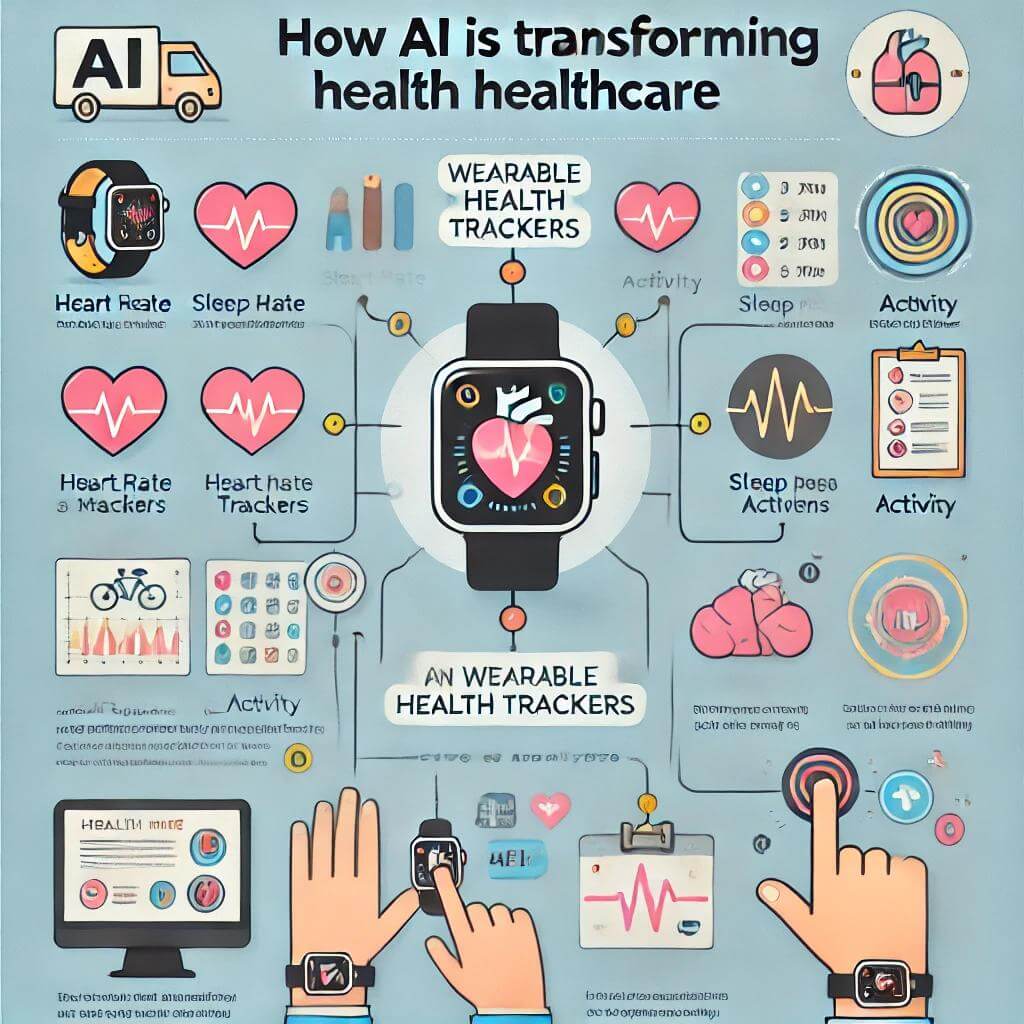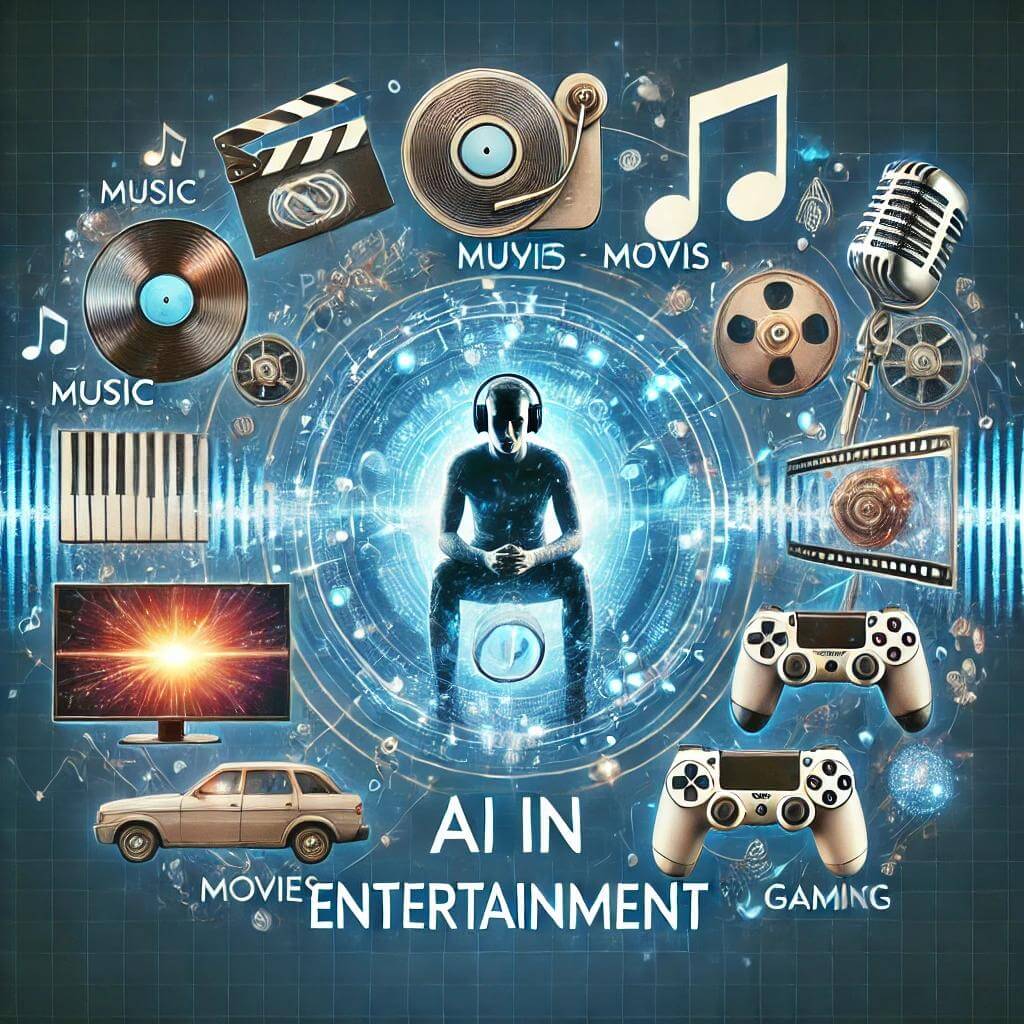How AI is Transforming Everyday Healthcare
In recent years, artificial intelligence (AI) has made significant strides in improving healthcare and personal wellness, making advanced health monitoring more accessible to people in their everyday lives. From wearable health trackers that monitor vital signs to AI-powered mental health apps, AI is playing a transformative role in healthcare. This article will explore how AI is improving health and wellness through innovative and accessible technology.
Wearable Health Trackers: Monitoring Health in Real Time
Devices like the Fitbit, Apple Watch, and Garmin have become essential tools for millions of people worldwide, helping them stay on top of their health. These wearable health trackers rely on AI to monitor key health metrics such as heart rate, sleep quality, and physical activity. AI-powered algorithms analyze this data to offer personalized insights, enabling users to make informed decisions about their well-being.
How AI Enhances Wearable Health Trackers
Wearable health devices collect vast amounts of data every day. AI processes this data to identify patterns and trends, helping users optimize their health routines. For instance, these trackers can detect changes in heart rate or sleep patterns that might signal stress, fatigue, or other health concerns, prompting users to take action before problems escalate.
Key Features of Wearable Health Trackers:
- Heart rate monitoring: AI-powered algorithms continuously monitor heart rate and alert users to abnormalities.
- Sleep analysis: AI analyzes sleep stages to provide insights into sleep quality and offer suggestions for improvement.
- Activity tracking: Devices monitor daily activity levels, including steps, calories burned, and exercise routines.
Popular AI-Powered Wearable Health Trackers
| Device | Key Features | AI Applications |
|---|---|---|
| Fitbit | Heart rate, sleep tracking, personalized insights | Sleep analysis, health recommendations |
| Apple Watch | ECG, activity monitoring, health alerts | Heart rate analysis, workout suggestions |
| Garmin | VO2 max, sleep, heart rate, and stress tracking | Stress detection, fitness recommendations |
AI in Telemedicine: A New Era in Virtual Healthcare
AI is also transforming telemedicine, making healthcare more accessible to people from the comfort of their homes. Virtual consultations powered by AI, such as those offered by Babylon Health and Ada Health, allow patients to receive medical advice, diagnoses, and treatment plans through online platforms. AI-based diagnostic tools enhance the accuracy of these consultations by analyzing patient symptoms and medical history in real-time.
How AI Improves Telemedicine
AI-powered telemedicine platforms use machine learning algorithms to analyze patient data, providing healthcare professionals with insights that lead to quicker and more accurate diagnoses. Virtual consultations are becoming an increasingly popular way for patients to get healthcare advice without the need for in-person visits, especially for non-emergency issues.
Benefits of AI in Telemedicine:
- Accessibility: AI-enabled telemedicine makes healthcare accessible to people in remote or underserved areas.
- Efficiency: AI-based diagnostic tools provide real-time insights, speeding up the consultation process.
- Personalization: AI tailors healthcare advice based on individual patient data, providing personalized care.
Popular AI-Powered Telemedicine Platforms:
- Babylon Health: Uses AI to provide virtual consultations, symptom analysis, and health assessments.
- Ada Health: AI-based platform offering personalized health assessments and symptom checks.
Personalized Fitness Plans: Tailored Workouts with AI
For fitness enthusiasts looking for personalized workout routines and diet plans, AI is becoming a game-changer. AI applications create tailored fitness plans by analyzing individual health data, such as activity levels, body composition, and fitness goals. This allows users to follow workout routines and diets that are specifically designed to help them achieve their objectives more efficiently.
How AI Tailors Fitness Plans
AI-driven fitness apps and platforms use data from wearable trackers and user input to generate customized workout routines. These plans adjust over time based on user performance, ensuring that the workouts remain effective and challenging. AI can also recommend dietary changes to support fitness goals, making it a comprehensive health management tool.
Examples of AI-Powered Fitness Apps:
- Freeletics: Uses AI to create personalized workout plans based on fitness goals and progress.
- MyFitnessPal: Combines diet tracking with AI-based recommendations to help users achieve their fitness goals.
Benefits of AI in Personalized Fitness:
- Customization: Tailors workouts to individual needs and fitness levels.
- Flexibility: Adapts to changes in fitness progress and health data.
- Comprehensive: Integrates workout routines with diet plans for holistic health management.
AI in Mental Health: Emotional Support at Your Fingertips
Mental health is another area where AI is making a significant impact. AI-driven apps like Woebot and Wysa provide emotional support and therapy sessions, offering users a convenient way to manage their mental well-being. These apps use natural language processing (NLP) to understand user inputs and offer personalized responses, helping individuals navigate stress, anxiety, and depression.
How AI-Powered Mental Health Apps Work
AI mental health apps simulate conversations with users, providing a virtual space to express thoughts and feelings. These apps use AI to offer real-time feedback and coping strategies based on the user’s inputs. While they’re not a replacement for professional therapy, they serve as a helpful tool for managing mental health on a daily basis.
Popular AI-Powered Mental Health Apps:
- Woebot: Offers AI-driven conversations to help users cope with anxiety, depression, and stress.
- Wysa: Uses AI to provide emotional support and self-care strategies for mental well-being.
Advantages of AI in Mental Health:
- Accessibility: Provides support anytime, anywhere, without the need for in-person visits.
- Personalization: Tailors responses to individual mental health needs.
- Real-time support: Offers instant emotional support and guidance during stressful situations.

AI in Medication Management: Ensuring Proper Treatment
Taking medications as prescribed is essential for managing chronic conditions and maintaining health, but it can be difficult to keep track of schedules. AI-powered medication management tools help patients stay on track by sending reminders, tracking doses, and ensuring medications are taken correctly.
How AI Helps with Medication Management
AI applications use machine learning to track medication schedules and send reminders to users when it’s time to take their medication. Some platforms also integrate with smart pill dispensers that ensure the correct dosage is taken. These tools are particularly beneficial for elderly patients and individuals with complex medication routines.
Examples of AI in Medication Management:
- Medisafe: An AI-driven app that sends medication reminders and tracks dosages to help users stay on top of their treatment.
- Pillo Health: A smart pill dispenser that uses AI to track and manage medication schedules.
Benefits of AI in Medication Management:
- Adherence: Helps patients take medications on time, improving health outcomes.
- Safety: Reduces the risk of missed doses or medication errors.
- Convenience: Automates medication tracking, simplifying complex treatment plans.
Conclusion
AI is transforming healthcare by making health management more accessible, personalized, and efficient. From wearable health trackers to AI-driven mental health apps, AI is empowering individuals to take control of their health and well-being in ways that were previously unimaginable. As AI technology continues to evolve, its role in healthcare will only become more prominent, offering even more innovative solutions to improve everyday health.




Post Comment